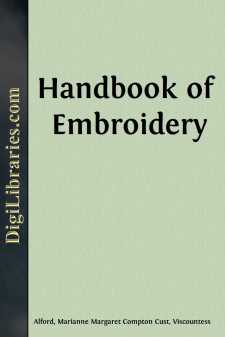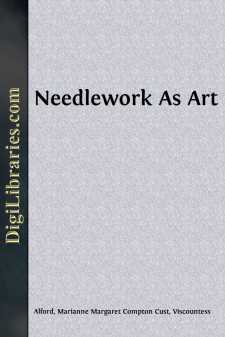Categories
- Antiques & Collectibles 13
- Architecture 36
- Art 48
- Bibles 22
- Biography & Autobiography 813
- Body, Mind & Spirit 141
- Business & Economics 28
- Children's Books 12
- Children's Fiction 9
- Computers 4
- Cooking 94
- Crafts & Hobbies 4
- Drama 346
- Education 46
- Family & Relationships 57
- Fiction 11826
- Games 19
- Gardening 17
- Health & Fitness 34
- History 1377
- House & Home 1
- Humor 147
- Juvenile Fiction 1873
- Juvenile Nonfiction 202
- Language Arts & Disciplines 88
- Law 16
- Literary Collections 686
- Literary Criticism 179
- Mathematics 13
- Medical 41
- Music 40
- Nature 179
- Non-Classifiable 1768
- Performing Arts 7
- Periodicals 1453
- Philosophy 64
- Photography 2
- Poetry 896
- Political Science 203
- Psychology 42
- Reference 154
- Religion 513
- Science 126
- Self-Help 83
- Social Science 81
- Sports & Recreation 34
- Study Aids 3
- Technology & Engineering 59
- Transportation 23
- Travel 463
- True Crime 29
Handbook of Embroidery
Categories:
Description:
Excerpt
PREFACE.
In drawing up this little “Handbook of Embroidery” we do not pretend to give such complete technical directions as would enable a beginner in this beautiful art to teach herself; because learning without practical lessons must be incomplete, and can only lead to disappointment.
We have sought, therefore, only to respond to the inquiries we are constantly receiving, and to supply useful hints to those who are unable to avail themselves of lessons, and are forced to puzzle over their difficulties without help from a trained and experienced embroiderer; at the same time, the rules we have laid down and the directions we have given may serve to remind those who have passed through the classes, of many little details which might easily be forgotten when the lessons are over, though so much of the success of embroidery depends upon them.
We have given a short description of the most useful stitches, and have pointed out their applicability to different styles of work; we have named the various materials which are best suited as grounds for embroidery, and the silks, filoselles, crewels, &c., which are most commonly employed, with practical rules for their use in the best and most economical manner.
Also we have given such plain directions as to stretching, framing, and cleaning the work as are possible in a limited space, and without practical illustration. We venture to hope we have thus supplied a want that has been long felt by those who interest themselves in the art in which Englishwomen once excelled, but which had languished of late years, and almost died out amongst us, though it has always been taught in many continental cities, where embroideries have never ceased to be required for church decoration.
We have abstained from giving any directions as to the tracing of designs upon material, for two sufficient reasons: firstly, that the Royal School of Art-Needlework has never supplied designs alone, or in any other form than as prepared work; and secondly, that having made experiments with all the systems that have been brought out for “stamping,” ironing from transfer-papers, or with tracing powder, it has been found that designs can only be artistically and well traced on material by hand painting. Those ladies who can design and paint their own patterns for embroidery are independent of assistance, and to those who are unable to do so we cannot recommend any of the methods now advertised.
It has been thought unnecessary to enter into the subject of ecclesiastical embroidery at present. This has been so thoroughly revived in England, and practised in such perfection by sisterhoods—both Anglican and Roman Catholic—as well as by some of the leading firms of church decorators, that we have not felt ourselves called upon to do more than include it in our course of lessons.
The æsthetic side of our subject we have purposely avoided, as it would lead us further than this purely technical guide-book pretends to go. But we propose shortly to bring out a second part devoted to design, composition, colour, and the common-sense mode of treating decorative Art, as applied to wall-hanging, furniture, dress, and the smaller objects of luxury....



